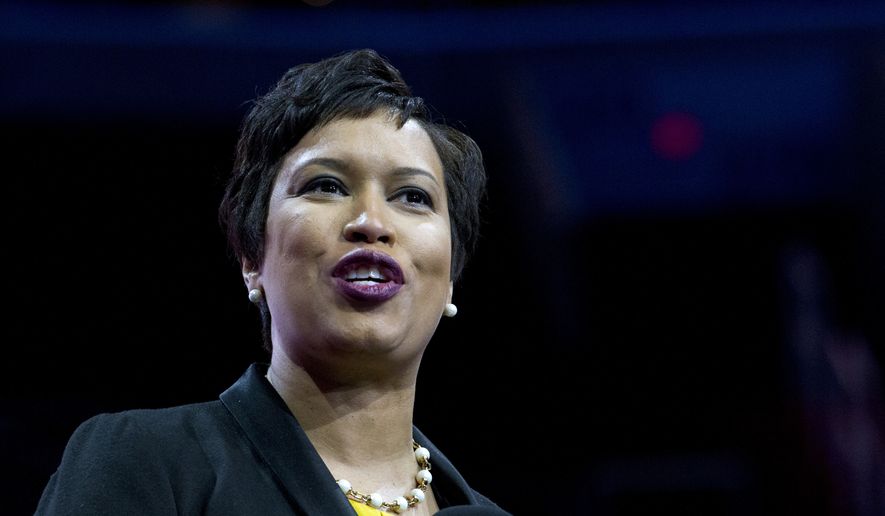D.C. business leaders called on city lawmakers Monday to cut $100 million in taxes as scheduled in January and not delay the cuts to pay for housing and education.
“Believe me, I more than anyone know investments in housing and education are important,” Anthony Williams, CEO of the Federal City Council, said at a joint press conference with the D.C. Chamber of Commerce. “But it’s also important to know that the spending on these programs comes from a robust, vibrant economy.”
Mr. Williams, a former D.C. mayor and chief financial officer, noted that city businesses will be hit with a higher minimum wage and paid family leave in the next few years. Tax cuts, he said, will lessen the financial burden — especially on restaurants, which often operate on razor-thin profit margins, even in good times.
The Federal City Council, a nonprofit focused on improving the District, and the D.C. Chamber of Commerce, which lobbies for thousands of city businesses, sent a letter Monday to the D.C. Council calling on it to “do its part now and follow through on its commitment to fully implement the tax reform that began in 2014.” The letter was signed by 200 business owners.
Chamber President Vincent Orange, a former council member, noted that the 2014 tax reform package was negotiated as a compromise between businesses and liberal advocacy groups, and he stressed that the deal should be honored.
“We’re here to hold the D.C. Council accountable,” Mr. Orange said at Monday’s press conference. “Once you reach an agreement, you stick to the agreement.”
The $100 million tax cuts are set to start Jan. 1 as part of a tax reform package the council enacted in 2014 based on recommendations from a panel of experts led by Mr. Williams. The reductions are to be triggered only if the District’s revenues reach a certain threshold.
The cuts will increase personal tax exemptions and deductions for residents to meet the federal level of $4,000. Businesses will see a reduction in the city’s franchise tax from 9 percent to 8.25 percent.
And the floor for the estate tax will be raised from $2 million to the federal level of $5.45 million, meaning the estates of those who die in the District will be taxed only if their value reaches the federal level.
In late April, council members David Grosso and Charles Allen said they favored delaying some of the cuts in exchange for more education funding after Mayor Muriel Bowser proposed only a 1.5 percent increase in per-pupil spending. At the time, Mr. Allen, Ward 6 Democrat, called for phasing-in the higher estate-tax floor.
Miss Bowser, a Democrat, has since pledged to raise per-pupil funding to the standard 2 percent increase. She also has staunchly defended the tax cuts, saying they would directly impact Washingtonians in a time of federal uncertainty.
Mr. Allen is still considering his push to delay some of the cuts to put more money into capital improvement for schools, spokesman Erik Salmi said Monday.
Mr. Grosso did not return a request for comment on whether he had changed his mind after Miss Bowser announced the education funding bump last week.
The planned cuts are likely to stay put: Only two lawmakers have called for a delay, and council Chairman Phil Mendelson signaled strong support for keeping cuts. Next year’s mayoral and legislative elections add pressure to keep the tax cuts.
Still, progressive groups such as the D.C. Fiscal Policy Institute, D.C. Action for Children, D.C. Working Families and the Fair Budget Coalition have said the money would be better spent on affordable housing, the homeless, schools and transportation.
“Investing in housing, schools, and vulnerable children and families have known payoffs. They support stable communities and families, and lead to better life outcomes for children,” Ed Lazere, executive director of the D.C. Fiscal Policy Institute, said last week. “These are far more important than tax cuts that no one can show will help the D.C. economy.”
Mr. Lazere was a member of the commission that brokered the tax cuts in 2014.
“In a year of extraordinary prosperity for the District, the D.C. Council has a moral obligation to prioritize the needs of D.C.’s most marginalized communities,” Monica Kamen, co-director of the Fair Budget Coalition, said last week. “Now’s the time for permanent affordable housing for people with no homes, not tax cuts for people with $5 million homes.”
• Ryan M. McDermott can be reached at rmcdermott@washingtontimes.com.




Please read our comment policy before commenting.